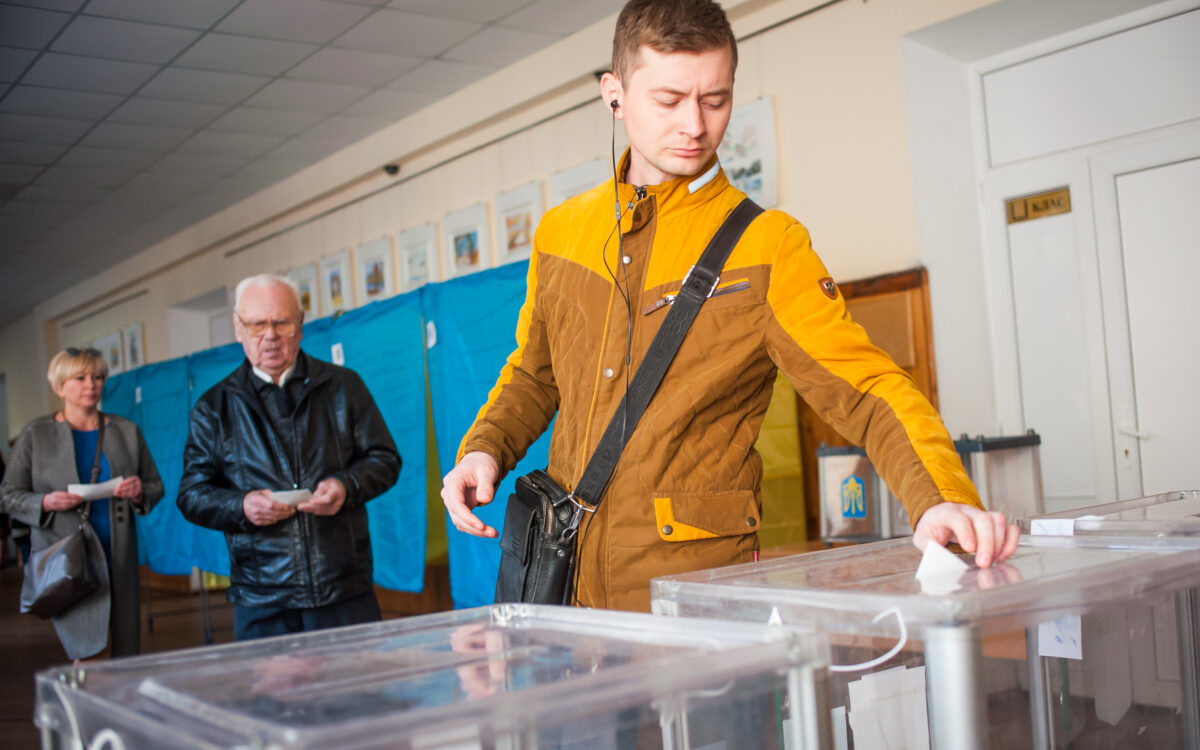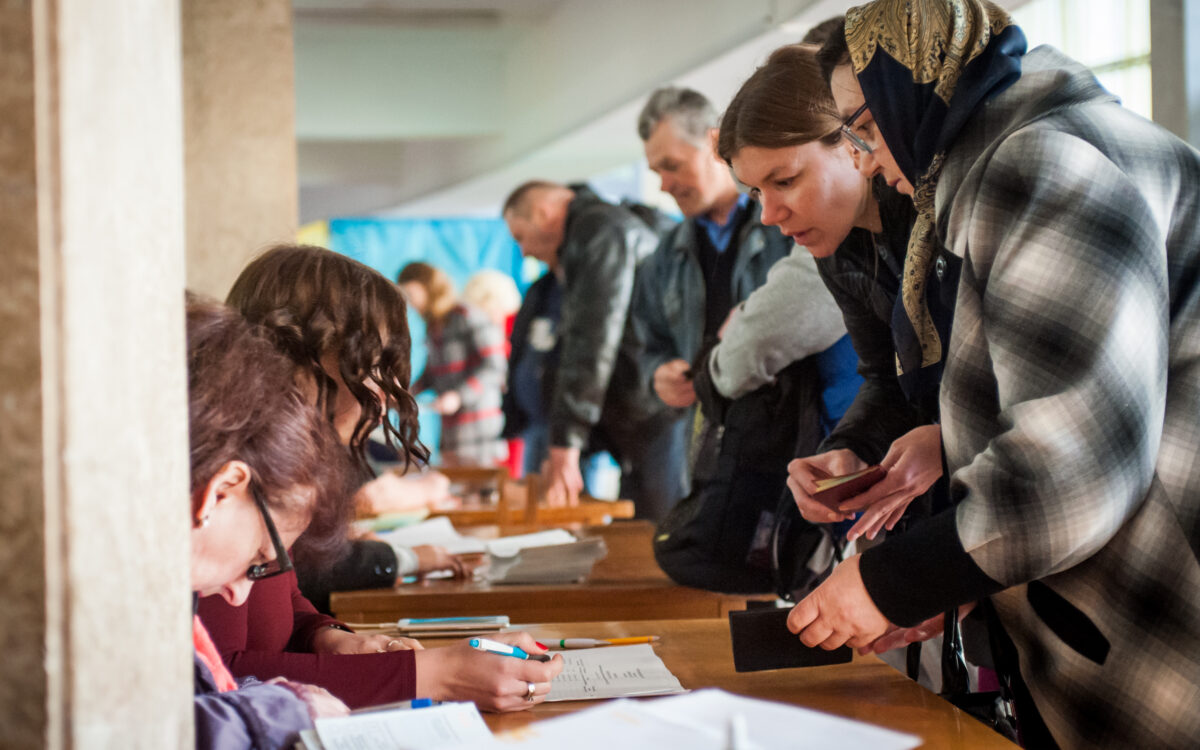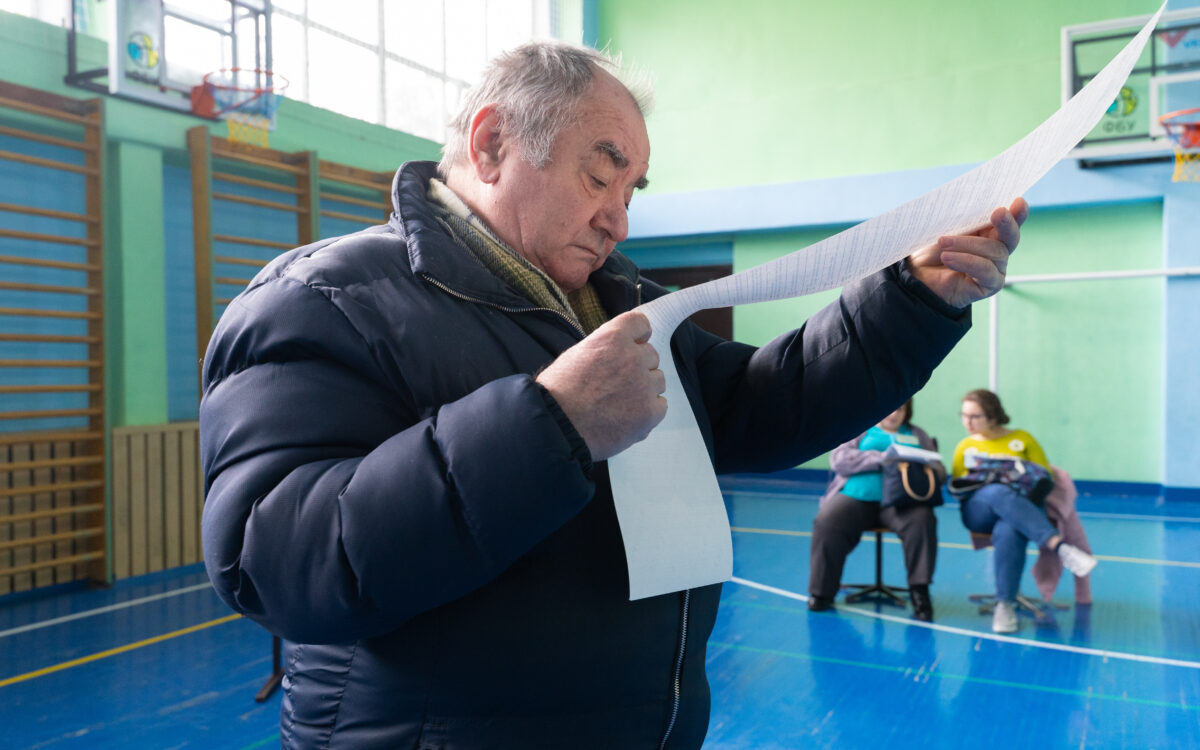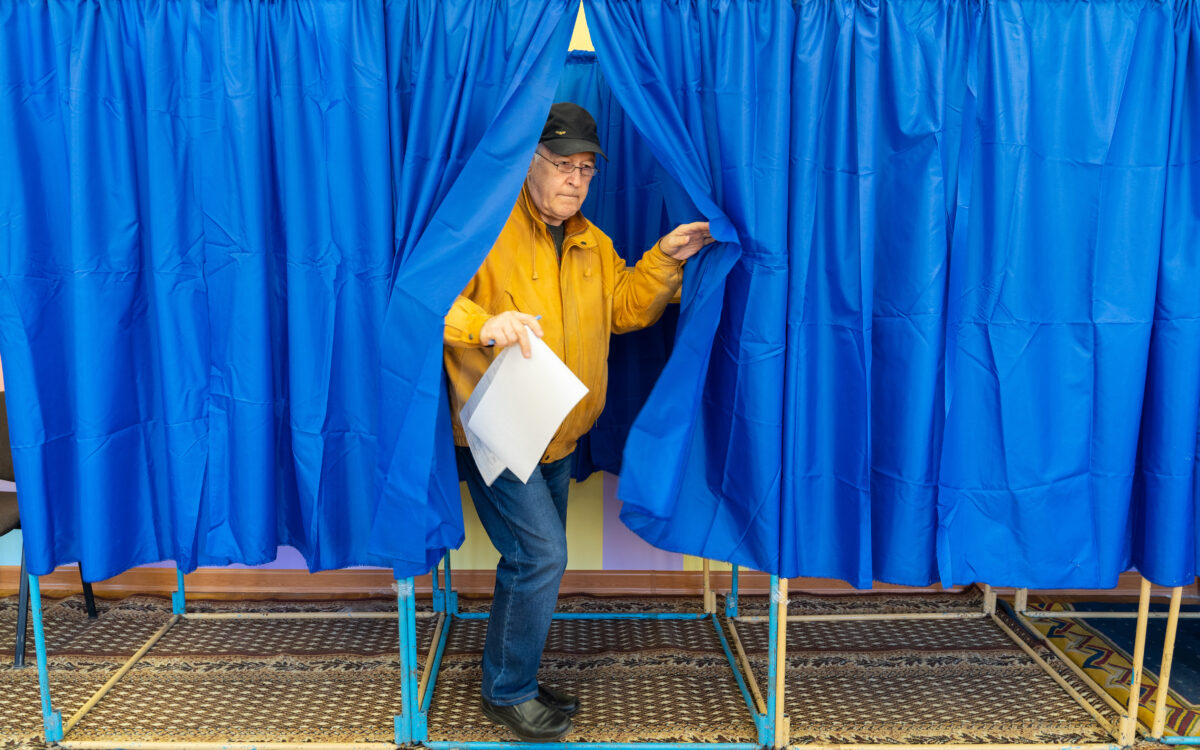
Democracy and Elections Digest #205 (May 18 – 31, 2024)
03.06.2024
IFES Ukraine Helps Ukrainian Media Keep an Eye On Political Party Finance
18.06.2024IFES Ukraine and Ukrainian CEC Visit Bulgaria to Observe EU Parliament Elections. On June 9th, 26 European Union member countries conducted elections for the European Parliament, where approximately 400 million people voted to elect candidates for 720 seats, 15 more than the previous convocation. Seat allocation per country is based on population, ranging from six Members of the European Parliament (MEPs) in Malta to 96 MEPs in Germany. Some EU countries voted early (Netherlands, Ireland, Czech Republic, Latvia, Malta, Slovakia, and Italy) while the rest voted on the European election day on Sunday, June 9th. Postal voting was also an option in some EU countries.
Alisa Shushkovska of IFES Ukraine and Maryna Sudnik and Olesia Chornokur-Shubina from the Central Election Commission’s secretariat, with support of the European Platform for Democratic Elections, observed European parliamentary elections in Bulgaria as a delegation. Bulgaria is allotted 17 national seats in the European Parliament and voters had a choice between 31 electoral entities, including political parties, coalitions, and one independent candidate. On the same day, Bulgaria conducted snap elections to its National Assembly following the early dissolution of the Parliament elected in April 2023.
According to the Bulgarian vote for the European Parliament, the 17 national seats were won by party members associated with the European People’s Party, Renew Europe, and the Party of European Socialists. Some candidates were not aligned with a political party. A more detailed result can be seen here.
Ukraine monitors voting procedures and practices in EU countries and is taking lessons to prepare for its elections to the EU Parliament upon accession to the EU.
IFES Ukraine Attends Ukraine Recovery Conference 2024 in Berlin. On June 11, the Ukraine Recovery Conference convened in Berlin with the participation of President Volodymyr Zelenskyy and German Chancellor Olaf Scholz. This is the third such conference since Russia’s full-scale invasion of Ukraine in February of 2022. This year’s event, with IFES Ukraine participation, mobilizes continued international support for Ukraine’s recovery, reconstruction, reform and modernization in the context of Russia’s full-scale war of aggression.
More than 2,000 people from different countries attended the two-day event, including elected officials, diplomats, and business and civil society representatives. IFES Ukraine was represented by Deputy Country Director Gio Kobakhidze and Senior Executive Officer Tetiana Kupisovska.
Panels discussed energy, human capital, mental health, and cultural heritage issues. The host country, Germany, emphasized civil society involvement and the role of connections between cities, municipalities, and communities.
In his welcoming remarks, President Zelenskyy emphasized Ukraine’s commitment to European values while highlighting progress made toward meeting necessary benchmarks for starting EU accession negotiations.
“Every nation that shares the common values of the entire Europe wants to live, just like us, in peace,” President Zelenskyy said. “Ukrainians belong to such a nation. For now, Ukraine has already fulfilled everything required to start negotiations on our country’s accession to the European Union. All the prerequisites have been met. This June should be the time to approve the negotiating framework and start the negotiations.”
Chancellor Scholz and European Commission President Ursula von der Leyen noted the EU will assist Ukraine in rebuilding its energy infrastructure after recent Russian strikes on Ukraine’s energy sector.
IRI Hosts Democratic Governance Conference, Publishes New Municipal Survey Results. On June 5, the International Republican Institute (IRI) hosted the Democratic Governance Conference 2024. The conference was attended by mayors, high-level national government officials, international partners, and civil society representatives. Among the topics discussed were the war-time challenges of Ukrainian cities and solutions for recovery.
During the conference, IRI also presented new results from its nationwide poll, which included citizens’ assessments of the quality of services in their cities and general attitudes about local governance.
The survey was conducted by the sociological group Rating on behalf of IRI’s Center for Analysis and Sociological Research in 21 cities of Ukraine, including Kyiv and all regional centers where the security situation allowed for the survey from April 13 to May 14 via face-to-face interviews in respondents’ homes. The sample consisted of 16,800 citizens aged 18 and older. The data obtained in each city were weighted by gender and age using national statistics as of January 1, 2022. The statistical error of each town does not exceed plus or minus 3.5 percent. The response rate was 49 percent on average.
According to the survey results, Ukrainians believe that in the process of post-war reconstruction, decisions should be made by mayors and city councils. The survey showed that the approval of current local authorities and mayors varies significantly from city to city. Thirty-eight percent have close relatives who are abroad because of Russia’s full-scale invasion of Ukraine. The migration factor and prospects for refugees’ return showed that 32 percent of those interviewed plan to return to Ukraine after the war ends, 31 percent do not intend to return, 19 percent have not decided, nine percent said that different relatives have various future plans, five percent plan to return soon and three percent were not able to answer.
Journal of Democracy Article – “Why Ukraine’s Elections Can Wait.” In May, the Journal of Democracy published an article headlined, “Why Ukraine’s Elections Can Wait.” The article’s authors are Olga Onuch and Lucan Way.
Ms. Onuch is a professor of comparative and Ukrainian politics at the University of Manchester and principal investigator of the MOBILISE Project. Mr. Way is a distinguished professor of democracy at the University of Toronto and co-chair of the Journal of Democracy’s editorial board.
In the article, the authors make the case for why now is not a good time to administer elections in Ukraine because of Russia’s ongoing war of aggression.
“Russian propaganda aside, organizing an inclusive, free, and fair national vote right now would be extremely challenging and could damage Ukraine’s democracy,” the authors write. “Despite martial law and the country’s existential struggle with Russia, Ukraine remains remarkably pluralist — even without elections.”
The article lists reasons for widespread opposition to wartime balloting and the decision not to hold elections is in line with recommendations of local elections-focused nongovernmental organizations and Ukrainian public opinion. According to a December 2023 survey, 84 percent of Ukrainians opposed holding a presidential election. When asked in February 2024 what should happen in lieu of elections, 69 percent preferred that President Zelenskyy stay in office until martial law’s conclusion.
The authors list the expense of elections, the difficulty of ensuring security amid Russian attacks and the challenges of voter participation for a significant number of Ukrainians that are not yet resolved – factors which make holding elections in war difficult to nearly impossible.
“Thus, while it is certainly possible to hold some kind of elections in Ukraine, it would be nearly impossible to hold ones that are free, fair, and inclusive,” the authors write. “Tremendous amounts of preparation and planning must go into any elections to mitigate the above-mentioned problems. Ukrainian leaders, election practitioners and international allies must begin preparing for future elections, designate aid to finance them and work to sort out any logistical questions. The time to plan is now.”
New Survey Shows Ukrainians’ Opinion on State of Democracy in Country. On June 4, the Kyiv International Institute of Sociology (KIIS) published public opinion poll results, which reveal that 43 percent of Ukrainians think the state of democracy worsened during President Zelensky’s five-year tenure.
Eleven percent of respondents link perceived democracy to the circumstances of war and 28 percent consider the government and state officials to blame for the decline. Three percent of those who think the situation deteriorated believe this is both due to the Russian war and government authorities’ actions. About 19 percent of respondents think the state of democracy has improved over the past five years while 29 percent see no change.
KIIS conducted the survey between May 16 and 22 and 1,002 respondents from all regions of Ukraine were interviewed except those living in the temporarily occupied territories.
In its reporting of the survey, the Kyiv Independent online newspaper notes, “The survey results stand in contrast to observations by Freedom House which said that Ukraine is one of the few countries in the region making successful strides toward democracy.”
Statement on Zelenskyy’s Legitimacy and Elections Pause in Wartime. On May 21, during a joint press conference with Ukrainian Foreign Minister Dmytro Kuleba, German Foreign Minister Annalena Baerbock stressed that her government has no concerns over the legitimacy of President Zelenskyy even though Ukraine cannot administer presidential elections under martial law.
“It’s clear that Volodymyr Zelenskyy is the legitimate president of Ukraine,” Baerbock said. “We will solve the challenges we’re facing together” and promised to support the reforms Ukraine is currently implementing.
Baerbock mentioned that the Ukrainian Constitution and the constitutions of many other countries, including Germany, regulate elections which cannot be held under martial law.
Also, on May 21 at a briefing cited by European Pravda, Peter Stano, European Commission spokesperson for foreign affairs, responded to Russian propaganda claiming that President Zelenskyy is not the legitimate president of Ukraine because his five-year presidential term concluded on May 21, 2024.
Mr. Stano said it is not possible to organize elections during wartime. The spokesperson added that under the Ukrainian Constitution, the President of Ukraine exercises his or her authority until the presidential office is assumed by a newly elected president. Continuity of power is one of the key principles of the Constitution and the public and primary political parties in Ukraine have absolutely no doubt about who their legitimate president is.
“We [the EU] also don’t have any such doubts. It’s President Zelenskyy,” Stano affirmed.
VC and ODIHR Consider Follow-up to PACE Resolution on Protecting Rights of Migrants, Refugees and Asylum Seekers During Election Campaigns. To remind Council of Europe member countries and political parties about the rights of international people to political participation and the need to avoid hate speech and xenophobic language in electoral campaigns, the Parliamentary Assembly of the Council of Europe (PACE) adopted its resolution 2525/24 titled, “The Theme of Migration and Asylum in Election Campaigns and its Consequences on the Reception of Migrants and Their Rights,” in January of this year.
The Council of Europe’s Venice Commission and the Office for Democratic Institutions and Human Rights (ODIHR) of the Organization for Security and Cooperation in Europe are now considering a follow-up to PACE Resolution 2525/24 titled, “The Theme of Migration and Asylum in Election Campaigns and its Consequences on the Reception of Migrants and Their Rights.”
The Venice Commission and ODIHR intend to consolidate case law available across member countries and at the European Court of Human Rights on regulating freedom of speech to safeguard human rights and social cohesion. This initiative will explore how definitions of hate speech and hate crime adopted by the Committee of Ministers may be incorporated in practical work of electoral administrations and political parties across Council of Europe member countries as well as provide an overview of good practices and emergency mechanisms to report and investigate alleged hate speech and incitement to hatred and discrimination in the news media and by public officials and political parties during election campaigns.
The Verkhovna Rada is considering amendments to its Code of Administrative Offenses and Criminal Code to combat discrimination based on gender identity and sexual orientation and hate speech. Draft Law Number 5488 was registered in 2021; but has yet to be considered by the Rada’s Legal Policy Committee. Ukrainian LGBT+ organizations are concurrently advocating for the adoption of the long-awaited Draft Law Number 9103, which introduces registered partnerships in Ukraine and provides same-sex couples access to the protection and social benefits available only to opposite-sex couples.






